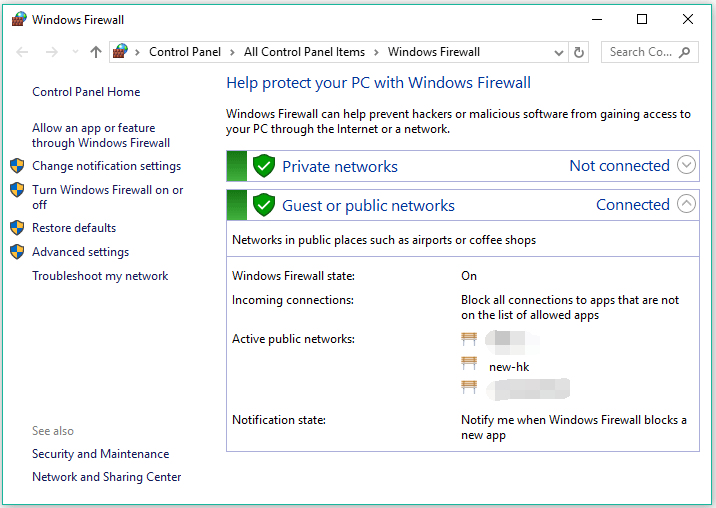You may not fully understand the importance and necessity of firewalls. Well, if your network or computer can access the outside world via the Internet, you need a firewall to protect your network, your personal computer, and the data in it.
Basic Understanding of Firewall
In computing, a firewall is a network security system that controls incoming and outgoing network traffic based on predetermined security rules. Firewalls typically create a barrier between a trusted internal network and an untrusted external network, such as the Internet. Firewalls are the first line of defense in network security.
Simply put, a firewall can actually be seen as a filter for data entering or leaving a network/computer. To make an analogy, you can think of a firewall as a security guard and decide who (external network) enters or leaves the building (internal network).

The firewall works by blocking or restricting network ports. Firewalls are designed to help prevent unauthorized access to the intranet (a local or restricted communications network, especially a private network you are connected to). All messages entering or leaving the intranet must pass through a firewall which checks each message and blocks messages that do not meet the specified security standards.
It is really necessary to prevent hackers and Trojans from attacking your computer. The difference with anti-virus software is that the main function of anti-virus software is anti-virus, which is to kill the virus that has entered your computer. The firewall is mainly based on defense, preventing Trojans from entering your computer and network hackers attacking.
The term firewall originally refers to walls used to confine fires within a building. The term was applied to network technology in the late 1980s, and it emerged when the Internet was fairly new in terms of global use and connectivity. The predecessor of the firewall for network security was the router used in the late 1980s.
Hardware Firewall Vs. Software Firewall
A firewall can be implemented in either hardware or software, but they have differences. Or it can be a combination of both, then it will be the ideal firewall configuration.
Hardware firewalls sit between the router and the Internet connection, so every network traffic from the outside network must go through your gatekeeper to log in before landing on any of your internal drives. With a hardware firewall, every computer connected to the local network can be protected.
Typically, hardware firewalls are used in networks of a certain size and are typically used in networks with high security requirements, like companies and large corporations. In order to properly protect the network without hindering performance, hardware firewalls require expert setup.
Hardware firewalls are great because they allow you to protect your entire network with a single device. The hardware firewall forms a physical barrier between the home network and the Internet, and can block incoming & outgoing packets as needed. Because hardware firewalls are dedicated network device, network data is typically delivered very quickly and does not have any negative performance impact on network speed.
However, the hardware firewalls cannot check the content. This means that hardware firewalls are well-suited for blocking certain sites based on blacklists, but they are not good choices for filtering traffic based on actual content.
Software firewalls are installed on individual computers (as same as any software) and you can customize it, which allows you to control its functions and protections. When data is scanned for threats by a software firewall, the information has already been passed through your router, network switch, and finally your local hard drive. Many software firewalls are resource intensive and can cause significant performance loss to your equipment.
Unlike hardware firewalls, Software firewalls can easily distinguish programs on your computer which means they can filter which data is allowed through based on content. This realizes allowing data to one program while blocking another. If your main focus on the firewall is your own or your child’s network security issues, then a software firewall is a good choice.
Summarize for some key points of these two kinds of firewalls: If the hardware firewall can block unsecured traffic based on the website or domain name, the software firewall can block the offending content through keywords contained in the content.
Hardware firewalls control 100% of the traffic on the network and are ideal for blocking entire websites and website categories. They may be cheaper because they often don’t have a monthly fee or an annual fee. They are very fast and do not affect network performance.
The control of Software Firewalls is better because they are installed on each device. They usually have excellent reporting & alerts, and they are much better for cyber security with kids. But software firewalls need to be installed on every single device you own and might not be supported on every device. What’s more, they can make your computer or device run slower, sometimes much slower.
The Best Firewall?
Now that you know the general knowledge of different types of firewalls, you can decide which firewall is right for you based on your own case. For the question of which one is the best choice, you can look for more guides on the internet to know more. What we want to tell is that you can actually run both a hardware firewall and a software firewall at the same time.